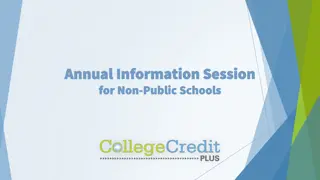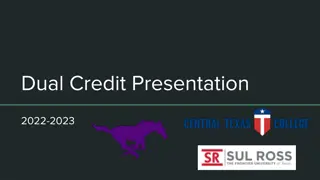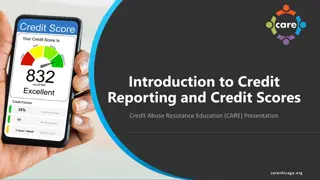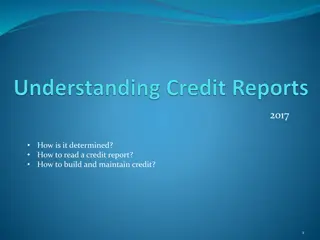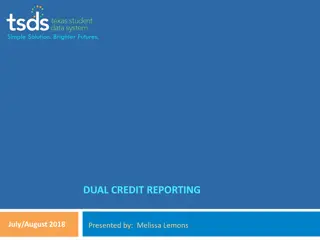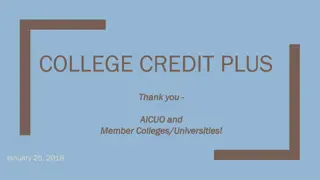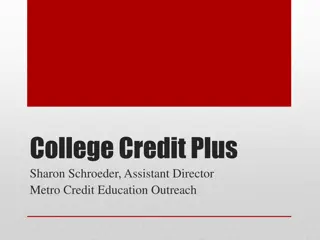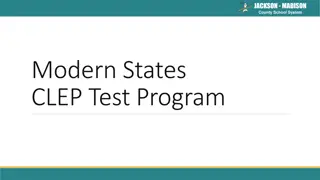College Credit Plus: Earn High School and College Credits Simultaneously
Find out about College Credit Plus program in Ohio where students in Grades 7 through 12 can earn high school and college credits concurrently by enrolling in college courses. Eligibility criteria, course options, credit requirements, and participation steps are outlined along with the assessment exam examples needed. Students can choose classes in different semesters and locations including online, high school, or college campus if partnered.
Download Presentation

Please find below an Image/Link to download the presentation.
The content on the website is provided AS IS for your information and personal use only. It may not be sold, licensed, or shared on other websites without obtaining consent from the author. Download presentation by click this link. If you encounter any issues during the download, it is possible that the publisher has removed the file from their server.
E N D
Presentation Transcript
Focus Learning Academies & Focus North High School
What is College Credit Plus? College Credit Plus is Ohio s dual credit program Students earn high school and college credit at the same time Students enroll in college courses and adhere to the requirements of the college
What is College Credit Plus? Students in Grades 7 through 12: Must complete an assessment exam and be determined eligible for College Credit Plus May apply to any public college or participating private college May apply to multiple institutions
What is College Credit Plus? Students in Grades 7 through 12: May choose from a variety of college- level courses (as determined by placement testing) Must be Ohio residents
What is College Credit Plus? Students in Grades 7 through 12: Can earn credit to satisfy both high school and college requirements 3+ Credit Hours = 1 High School Unit Must successfully complete the courses in order to earn the credit
What is College Credit Plus? Students in Grades 7 through 12: May take classes in the summer, fall, and spring semesters May take courses at the high school1, college campus, or online 1This option is available if the high school has partnered with a college or university to offer college courses at the high school
How can students participate? Step 1: Students must be eligible for College Credit Plus participation based on assessment exam scores
How can students participate? Assessment exam examples: ACT, SAT, Accuplacer, ALEKS, PlaceU, MapleSoft Each college/university has different exam requirements
How can students participate? Students scores must indicate that they are ready for college-level courses in at least one subject area Colleges and universities will review students scores using statewide standards
How can students participate? If a student s scores are not college- level, other conditions may be considered depending on the exam scores and if the student has: Overall GPA (3.0) or Recommendation form/letter
How can students participate? Step 2: Students must apply for admission Contact the college to learn about their processes, paperwork and deadlines Colleges have the final decision on student admission
How can students participate? Step 3: If the student is considered eligible and has been admitted to the college/university, then the college will discuss course options with the student
What courses can a student take? College advisors will help students know which courses they can take Based on assessment scores Based on course prerequisites
What courses can a student take? Courses can satisfy high school graduation requirements School counselors can help students understand requirements and course substitutions Schools might have additional requirements in addition to the state minimum
What courses can a student take? Courses must be college-level or non- remedial Courses must be nonreligious
What are other requirements? Grades College Credit Plus grades earned in the college course is the same grade that will be on the high school transcript Grades will be factored into the high school and college GPA
What are other requirements? Grades If a high school uses a weighted grading scale for Advanced Placement, International Baccalaureate, or Honors courses in a subject area, then College Credit Plus courses in the subject area will be weighted using the same scale
What are other requirements? Students may take College Credit Plus courses in subject areas that will satisfy graduation requirements Students must complete End of Course exams for English, math, and science
How many classes can students take? Students may be enrolled in up to 30 credit hours including high school only courses: 30 (high school credits x 3) = Maximum college credit hours The maximum number of credits allowable during the program is 120
How many classes can students take? If a student enrolls in more than 30 credit hours: School will discuss with the student whether to: Drop the course or Pay for the entire course
How many classes can students take? If a student enrolls in more than 30 credit hours and PAYS for the course: Student/family will assume the cost of course credits and books at the college s standard rates
What are differences between high school and college? Tests: High School: Tests are sometimes given weekly or at the end of the chapter College: Tests are generally fewer in number covering more material
What are differences between high school and college? Study Time: High School: Required homework ranges between 1 to 3 hours per day College: Standard rule of 2 to 3 hours of homework for every hour spent in class (3 to 5 hours per day)
What are differences between high school and college? Knowledge Acquisition: High School: Information provided mostly in-class. Out-of-class research is minimal. College: Coursework will generally require more independent thinking, longer writing assignments, and out- of-class research
What are differences between high school and college? Grades: High School: Numerous quizzes, tests, and homework assignments College: Fewer tests and fewer, if any, homework assignments will be used to determine final grades
What are differences between high school and college? Parent Role: High School: Parents are strong advocates working closely with teachers and counselors College: Parent serves as a mentor and support for the student; the college views the student as independent decision-maker
What are differences between high school and college? Parent Role: College: The Family Education Rights and Privacy Act (FERPA) protects student education records
What are the benefits of participating? Students can earn high school and college credits at the same time Students can get a head start on college degrees or certificates
What are the benefits of participating? Students can experience college early to understand the expectations of college life Students can save tuition and textbook costs
What are the consequences of underperforming? If students fail or withdraw too late from a college course, the district may seek reimbursement for the tuition costs from the student/family The grades that students earn are on the college transcript forever
What are the consequences of underperforming? If students perform poorly, they may be placed on academic probation or dismissal by the college If students fail or withdraw often, future financial aid may be impacted negatively
What are the expenses for College Credit Plus? At public colleges or universities, no cost to the students/families for tuition, required fees, and books At private colleges or universities, a small cost per credit hour may be charged
What are the expenses for College Credit Plus? Some optional expenses are the responsibility of the student/family Example: Parking and transportation
What are the support services for students? High school counselors continue to provide assistance to all College Credit Plus students College advisors provide course selection assistance Colleges must provide the same supports to College Credit Plus students as they do other students
What about athletic eligibility? Student athletes should: 1. Confirm their school is an Ohio High School Athletic Association (OHSAA) member 2. Learn the OHSAA requirements
What about athletic eligibility? Student athletes should: 3. Know that summer term CCP courses may not be used to bring a student into compliance with the OHSAA requirements for interscholastic athletic participation
Will the course credits transfer? Certain general education and technical courses will transfer especially from one public college to another public college Students must check with colleges to confirm transferability Students should check https://transfercredit.ohio.gov/ for transfer info
What does being college- ready mean? Being college-ready is more than just being academically ready Consider emotional and social transition and college expectations Consider time management & organizational skills
What does being college- ready mean? Being college-ready is more than just being academically ready Grades earned in a College Credit Plus course are for high school AND college credit and will be calculated into the student s GPA College Credit Plus credits will be utilized in the calculation of financial aid
What are the deadlines? April 3, 2023 Students must complete and return to the school office the Intent to Participate form Check ACT and SAT dates Test early to meet college/university admission deadlines (if required)
What are the deadlines? College/Universities Check each college s deadline for admission Find out about assessment testing requirements Summer semester deadline will be early as classes usually start in May
Do you have other questions? www.ohiohighered.org/ccp






